|
|
|
Sort Order |
|
|
|
Items / Page
|
|
|
|
|
|
|
| Srl | Item |
| 1 |
ID:
118758
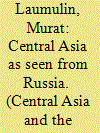

|
|
|
|
|
| Publication |
2012.
|
| Summary/Abstract |
This is a survey of what has been written in Russia about Central Asia, of the subject range and scope of problems that our Russian colleagues have discussed in their works, and of what they think about the region's future. For obvious reasons, the Russian public as a whole and political scientists and politicians as its part cannot remain indifferent to what is going in Central Asia. Until quite recently, Russia and Central Asia were parts of a single state; today they remain tied together by geographic and geopolitical proximity. For these reasons, the region is still part of Russia's information expanse.
The Russian Federation, which has scored quite a few foreign policy successes, is still facing old and persisting problems and is coping with the new challenges that crop up in the contemporary world. The integration initiatives formulated by Russia are hailed by some of its post-Soviet partners and rejected (or even undermined) by others.
|
|
|
|
|
|
|
|
|
|
|
|
|
|
|
|
| 2 |
ID:
118751
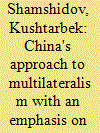

|
|
|
|
|
| Publication |
2012.
|
| Summary/Abstract |
This research considers that from a regional perspective, multilateralism can be an effective way to understand great power behavior on the international arena. The way emerging great powers interact with neighboring countries, and the way they work with regional powers has always been one of the best indicators of their future intentions as a great power. This concept proves very useful when examining an emerging power's capacity and attempting to predict its future behavior in the international system. There is tremendous speculation around what kind of China we are going to see in the near future, particularly if China surpasses all other states economically. The objective of this research is to contribute to this question by examining China's use of multilateralism in its near neighborhood, more specifically by examining the form of multilateralism China is using to engage with Central Asia.
|
|
|
|
|
|
|
|
|
|
|
|
|
|
|
|
| 3 |
ID:
118759


|
|
|
|
|
| Publication |
2012.
|
| Summary/Abstract |
One of the main problems of economic development is to ensure stable economic growth. This article examines some issues relating to the measurement of economic growth in the context of Central Caucaso-Asia, a geopolitical region which includes the countries of the Central Caucasus (Azerbaijan, Armenia and Georgia) and Central Asia (Kazakhstan, Kyrgyzstan, Tajikistan, Turkmenistan and Uzbekistan).
It should be emphasized that this problem has been analyzed in a number of significant publications. In order to measure economic growth, it is particularly important to use a more or less adequate method allowing a spatial comparison of countries and regions. But at present such a comparison is complicated by the existence of the so-called "catch-up effect."
The approach proposed below makes it possible to remove this effect and make a more adequate comparison of economic growth in countries and regions (with a case study of the Central Caucaso-Asian countries).
|
|
|
|
|
|
|
|
|
|
|
|
|
|
|
|
| 4 |
ID:
118754
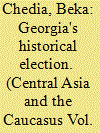

|
|
|
|
|
| Publication |
2012.
|
| Summary/Abstract |
On 1 October, 2012, the Georgian people made an important historical choice in favor of the Georgian Dream political opposition coalition headed by billionaire Bidzina Ivanishvili. This event will undoubtedly go down in the country's annals as the first time the opposition was brought to power not by revolution, but by election. And despite a certain opinion prevailing in society that a revolution might be possible, political tradition in post-Soviet Georgia took an extremely unexpected turn.
The thing is that elections of any scope in Georgia have long failed to be a mechanism for bringing about a democratic change in power, acting instead as a pretext for carrying out coups or revolutions. Since the Soviet Union collapsed and Georgia acquired its independence, essentially no power change in the country has occurred by means of an election.
|
|
|
|
|
|
|
|
|
|
|
|
|
|
|
|
| 5 |
ID:
118756
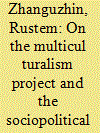

|
|
|
|
|
| Publication |
2012.
|
| Summary/Abstract |
The subject of my article is relatively novel for Ukraine, a country that has been drawn into the worldwide development of multiculturalism. This means that the academic community should identify the parameters, fundamental features, and characteristics of the related changes.
In the course of our project we posed ourselves the task of identifying, on the one hand, the basic features of the Ukrainian society conducive to its multicultural format; on the other, the state of diverse ethnocultural groups living in Ukraine and their religious and cultural parameters that make it easier/harder to build up a multicultural society in the republic's very specific conditions.
|
|
|
|
|
|
|
|
|
|
|
|
|
|
|
|
| 6 |
ID:
118752
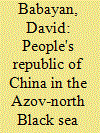

|
|
|
|
|
| Publication |
2012.
|
| Summary/Abstract |
The Azov-North Black Sea Subregion is one of the planet's strategically important areas; it is where the interests of different countries meet and intertwine. It is also tied by multiple threads not only to the Azov-Black Sea Region, but also to different regions of Russia and Ukraine.
The People's Republic of China (PRC) is pursuing an active policy in the above-mentioned regions. Furthermore, it is primarily interested in the Crimea, which virtually adjoins the Caucasus, the Rostov region, and Donbass (particularly the Lugansk and Donetsk regions); by establishing contacts with them, the PRC is strengthening its position in the Northeast Black Sea and Azov regions. This kind of policy is in keeping with China's overall geopolitical strategy in the Black Sea basin; below we will look at some of its vectors.
|
|
|
|
|
|
|
|
|
|
|
|
|
|
|
|
| 7 |
ID:
118755


|
|
|
|
|
| Publication |
2012.
|
| Summary/Abstract |
By mid-2011, the Republic of South Ossetia (RSO) was gradually sliding into the abyss of a political, social, and economic crisis. The people of South Ossetia had lost confidence in those who ruled them: the republican leaders were making too many mistakes, the republican elite were bogged in contradictions, while postwar rehabilitation was deliberately slowed down. This and the conviction, very popular in the Russian public (and even in the expert community), that the rehabilitation money was being shamelessly embezzled served as another argument in the political struggle raging in the RSO.
Very much as usual, an external factor (in this case Russia) merely added to the far from simple situation. I have in mind certain bureaucrats accustomed to semi-military discipline and "gray practices."
|
|
|
|
|
|
|
|
|
|
|
|
|
|
|
|
| 8 |
ID:
118757
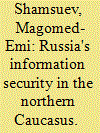

|
|
|
|
|
| Publication |
2012.
|
| Summary/Abstract |
The Northern Caucasus, home to numerous ethnicities, is a challenge to the political administration and national security of the Russian Federation; many problems of state order and ethnic relationships, caused by rivalry among political and ethnic elites for power and influence, have reached a critical level. There are ethnic and clan contradictions and territorial disagreements.
Today, the information security of the Northern Caucasus should be discussed at two levels-domestic and global. The former is related to the region's status and role in Russia's domestic policy and development and the latter to its place in Russia's foreign policy and the interest of foreign states and international organizations in the macro region.
In one of his books, Andrey Zdravomyslov wrote that the Northern Caucasus owed its international weight to the fact that it was situated at the crossing of geopolitical "power" lines, "the crossroads of geopolitical aims." On 12 November, 2009, in his address to the Federal Assembly, President of Russia Dmitry Medvedev pointed out that "our most serious, domestic political problem [is] the situation in the North Caucasus."
|
|
|
|
|
|
|
|
|
|
|
|
|
|
|
|
| 9 |
ID:
118753


|
|
|
|
|
| Publication |
2012.
|
| Summary/Abstract |
In recent years, Central Asia and the Caucasus have traditionally been a priority of Turkey's foreign policy. Since the beginning of the 1990s, Ankara has been pursuing an active campaign aimed at establishing close relations with the Turkic republics in this region. However, despite the loud statements and assorted declarations about the development of friendly relations with fraternal peoples, Turkey has not made any significant progress in this vector (apart from strengthening its relations with Azerbaijan).
Furthermore, when the Arab Spring uprisings began at the end of 2010-beginning of 2011, Turkey's official authorities were accused, both inside and outside the country, of conducting a one-dimensional foreign policy oriented only toward the Arab world. The opposition also joined these accusations, saying that the ruling Justice and Development Party was ignoring the Central Asian vector of foreign policy.
|
|
|
|
|
|
|
|
|
|
|
|
|
|
|
|
| 10 |
ID:
118750
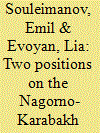

|
|
|
|
|
| Publication |
2012.
|
| Summary/Abstract |
The winter months of 2011/2012 marked the 20th anniversary of the beginning of full-scale warfare in the highlands of Nagorno-Karabakh, de jure an Azerbaijani enclave inhabited mostly by ethnic Armenians and controlled by the latter and an unrecognized republic that has essentially been claiming independence since the final days of the Soviet Union. The armed conflict in Nagorno-Karabakh and adjacent areas, which with various levels of intensity lasted from the end of the 1980s until 1994 when a ceasefire brokered by Moscow was signed, has greatly shaped the post-Soviet independence of Armenia and Azerbaijan, contributing to the long-term fragmentation of the Southern Caucasus and complicating its integration into world affairs. Indeed, the fundamentals of the regional power constellation that has endured since then were laid down at the beginning of the 1990s, with the Karabakh conflict playing a significant role in it.
|
|
|
|
|
|
|
|
|
|
|
|
|
|
|
|
|
|
|
|
|